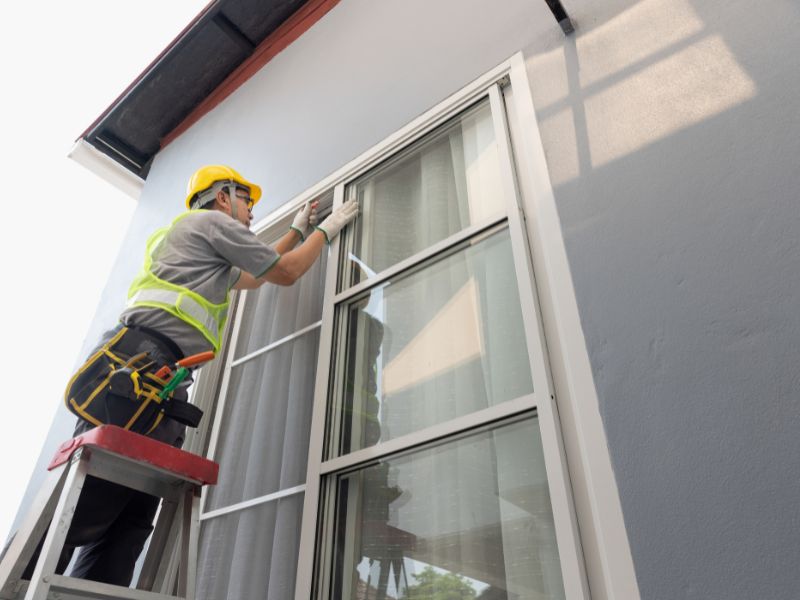- Structural Integration: These windows become an integral part of the house’s structure, offering excellent stability and durability.
- Design Flexibility: With new construction, you have the flexibility to choose the exact window size and style that fits your architectural plans without being limited by existing window openings.
- Optimal Insulation: Properly installed new construction windows can provide superior insulation as they are integrated into the building’s envelope from the outset.
- Ease of Installation: Replacement windows are generally easier and quicker to install since they fit into the existing window openings without the need to remove exterior materials.
- Less Invasive: Because the installation is less invasive, there is minimal disruption to the interior and exterior of your home. This means no need to worry about repainting or patching up exterior walls.
- Cost-Effective: With less labor and fewer materials required for installation, replacement windows can often be a more cost-effective solution compared to new construction windows.
- You are building a new home.
- You are undertaking significant renovations that involve removing exterior walls or siding.
- You want complete flexibility in window design and placement.
- You are replacing old, inefficient windows in an existing home.
- You want a quicker, less invasive installation process.
- You are looking for a cost-effective way to upgrade your windows and improve energy efficiency.

Choosing between new construction windows and replacement windows can be a big decision for any homeowner. Both have their own unique benefits and are designed for different scenarios. Understanding these differences can help you make an informed choice for your home.
Understanding New Construction Windows
When a new home is being built, new construction windows are typically used. These windows are designed to be installed directly onto the frame of the house before the exterior materials such as stucco, brick, or siding are applied. New construction windows come with a nailing fin around the perimeter, which is used to attach the window to the wooden studs of the house.
Benefits of New Construction Windows:
- Structural Integration: These windows become an integral part of the house’s structure, offering excellent stability and durability.
- Design Flexibility: With new construction, you have the flexibility to choose the exact window size and style that fits your architectural plans without being limited by existing window openings.
- Optimal Insulation: Properly installed new construction windows can provide superior insulation as they are integrated into the building’s envelope from the outset.
Understanding Replacement Windows
Replacement windows, also known as retrofit windows, are designed for existing homes where the old windows need to be replaced. These windows are custom-built to fit into the existing window openings, which means there is no need to disturb the surrounding walls or trim. Replacement windows do not come with a nailing fin and are installed directly into the old window frame.
Benefits of Replacement Windows:
- Ease of Installation: Replacement windows are generally easier and quicker to install since they fit into the existing window openings without the need to remove exterior materials.
- Less Invasive: Because the installation is less invasive, there is minimal disruption to the interior and exterior of your home. This means no need to worry about repainting or patching up exterior walls.
- Cost-Effective: With less labor and fewer materials required for installation, replacement windows can often be a more cost-effective solution compared to new construction windows.
When to Choose New Construction Windows
If you are building a new home or undertaking a major renovation where walls are being rebuilt or significantly altered, new-construction windows are the ideal choice. They allow for complete customization and ensure that your windows are seamlessly integrated into the structure of your home.
Additionally, if you plan to replace your home’s exterior siding or stucco, it might be worth considering new construction windows. Since the exterior material will be removed anyway, installing new construction windows can provide a fresh start and potentially better energy efficiency.
When to Choose Replacement Windows
For most homeowners looking to upgrade their existing windows, replacement windows are the most practical choice. They are designed to fit into your existing window openings, making the installation process straightforward and less disruptive. Replacement windows are perfect for enhancing energy efficiency, updating the look of your home, and improving overall window performance without the need for extensive construction work.
Making the Right Choice
Both new construction and replacement windows offer distinct advantages depending on your specific needs and the scope of your project.
Consider new construction windows if:
- You are building a new home.
- You are undertaking significant renovations that involve removing exterior walls or siding.
- You want complete flexibility in window design and placement.
Consider replacement windows if:
- You are replacing old, inefficient windows in an existing home.
- You want a quicker, less invasive installation process.
- You are looking for a cost-effective way to upgrade your windows and improve energy efficiency.
Choosing the right type of window can significantly impact the comfort, appearance, and energy efficiency of your home. By understanding the differences between new construction and replacement windows, you can make a decision that best suits your needs and budget.



